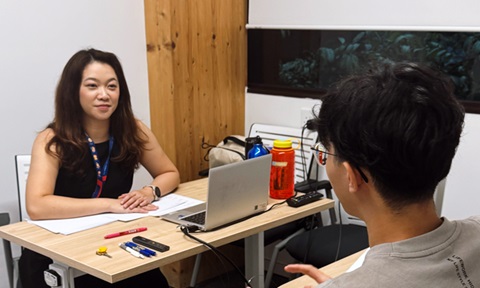A holistic approach to managing the “Three Highs”
Nantah alumnus and TCM physician Fong Cheng Ek (Arts/1970) shares some simple TCM health tips to manage high blood pressure, blood sugar and blood cholesterol.
By Jasmine Tiong
 In recent years, an ageing population
and unhealthy lifestyle habits have contributed to the rising prevalence of metabolic syndrome among Singapore residents. Metabolic syndrome is a set of conditions that can lead to serious health problems such as diabetes and heart disease. Its risk
factors include the ‘three highs’ – high blood pressure, high blood sugar and high blood cholesterol.
In recent years, an ageing population
and unhealthy lifestyle habits have contributed to the rising prevalence of metabolic syndrome among Singapore residents. Metabolic syndrome is a set of conditions that can lead to serious health problems such as diabetes and heart disease. Its risk
factors include the ‘three highs’ – high blood pressure, high blood sugar and high blood cholesterol.
Western medicine is the most commonly taken approach for addressing health issues, but the last few years have seen a rise in the awareness of the benefits of Traditional Chinese Medicine (TCM) around the world. Today, TCM can play a significant part in meeting healthcare challenges and complementing Western medicine for patients of all ages.
Here are some TCM health tips that you can try on your own to manage the “three highs”, shared by Nantah alumnus and TCM physician Fong Cheng Ek (Arts/1970) at the Distinguished Alumni Forum conducted in Chinese on 28 April.
View the recording of the forum below:
High blood pressure
Based on TCM research findings, high blood pressure is mainly due to liver heat, Qi and blood deficiency, phlegm turbidity, and yin-yang deficiency. Common symptoms include headaches, dizziness and stroke. As there is no single Chinese herb solution that can effectively address all four causes of high blood pressure, patients should consult a TCM physician to determine a suitable treatment method.
Liuwei Dihuang pills and Guilu Erxian glue are recommended for high blood pressure patients with kidney and yin-yang deficiency, respectively. These supplements are commonly available in TCM retail outlets.
Patients with high blood pressure are also advised to eat foods rich in potassium and calcium, such as celery, carrot, milk, walnut and fish.
Pressing regularly on the two acupoints of quchi (曲池穴) and taiyuan (太渊穴) can help to lower blood pressure as well.
High blood sugar
High blood sugar is also known as diabetes. According to TCM studies, diabetes is mainly due to spleen and kidney deficiency, Qi and yin-yang deficiency, lung and stomach heat. Common symptoms include excessive drinking and urination.
Some recommended diet therapy recipes for patients with diabetes include Chinese yam and barley porridge, wolfberry fried with bitter melon, and huangqi and corn silk drink. Patients can also try compound Chinese herbal medicines such as a decoction of peach kernel and gegen qinlian soup to activate their Qi and lower their blood sugar, respectively.
Making a visit to your trusted TCM clinic for an acupuncture session may be helpful as well.
High blood cholesterol
In TCM, high blood cholesterol is due to weakness in the liver, spleen and kidney. These result in insufficient Qi and blood in the patient’s body. Symptoms include phlegm build-up, blood stasis and water retention.
Patients are recommended to consume zexie, beans, cattail pollen and seaweed to help suppress their cholesterol intake. As for enhancing cholesterol output, patients can take bupleurum root, capillary wormwood, turmeric and submature bitter orange. Honey, Chinese caterpillar fungus, glossy privet fruit and hawthorn can also be consumed to adjust blood cholesterol levels.
Supplements such as hongqu capsule, ginkgo biloba and evening primrose can be helpful. Hawthorn and chrysanthemum tea, wolfberry drink, and black fungus cooked with crystal sugar are recommended diet therapies for patients with high blood cholesterol.
The suggested acupoints are fenglong (丰隆), zusanli (足三里), sanyinjiao (三阴交), neiguan (内关) and tianshu (天枢).
As symptoms and physical conditions and TCM treatment plans may differ from patient to patient, individuals are strongly encouraged to consult a doctor or TCM physician for an accurate diagnosis before consuming these herbs and ingredients. TCM serves as a supplementary treatment to existing methods and medications administered to improve the condition of patients diagnosed with any of the “Three Highs”.
 Forum speaker Fong Cheng Ek (Arts/1970) (left) and moderator Tay Boon Suat (Commerce/1974) at the Distinguished Alumni Forum held on 28 April 2021.
Forum speaker Fong Cheng Ek (Arts/1970) (left) and moderator Tay Boon Suat (Commerce/1974) at the Distinguished Alumni Forum held on 28 April 2021.
Nurturing future generations of TCM physicians
NTU offers a unique Double Degree in Bachelor of Sciences in Biomedical Sciences and Bachelor of Chinese Medicine. Widely known as the TCM programme, this innovative five-year course combines the western approach to Biomedical Sciences with TCM to nurture a new breed of TCM physicians. Since its establishment in 2005, more than 300 students have graduated from the TCM programme.
You can support the TCM programme by giving to the TCM Advancement Fund. Your gift will empower our students and faculty to reach their fullest potential and conduct research that brings about novel ways to cure diseases and relieve ailments across the globe.






